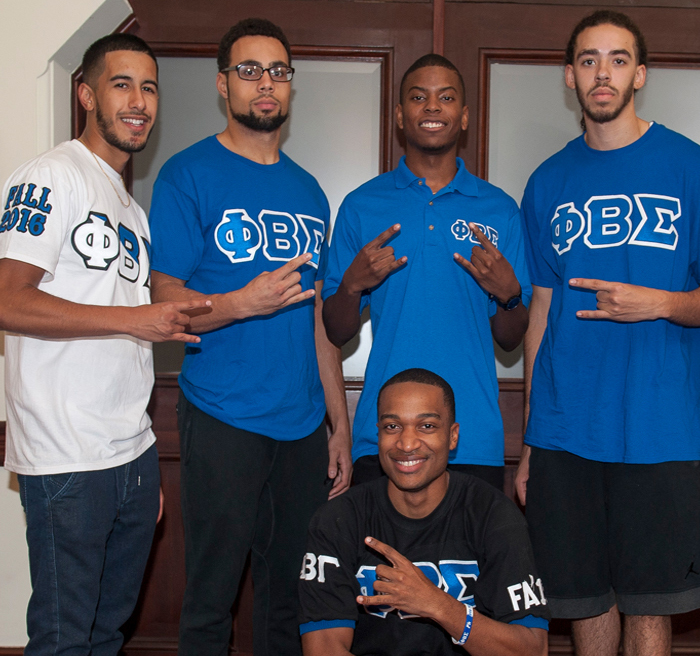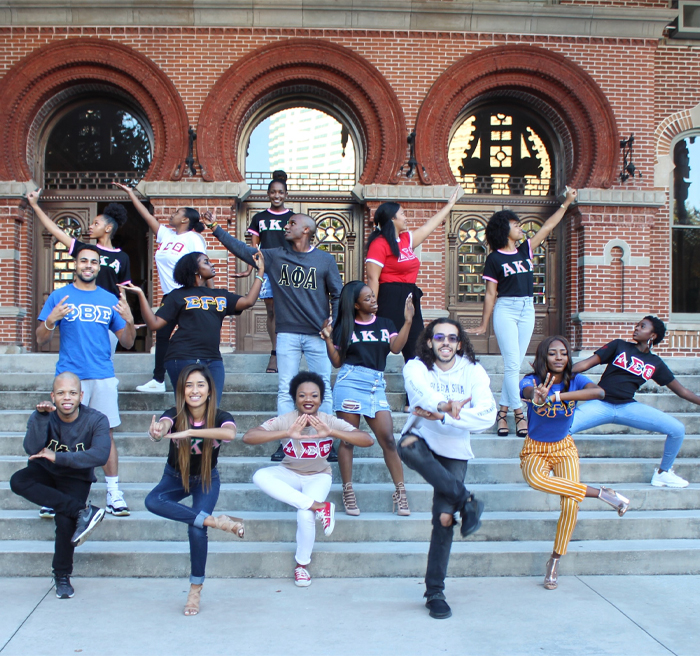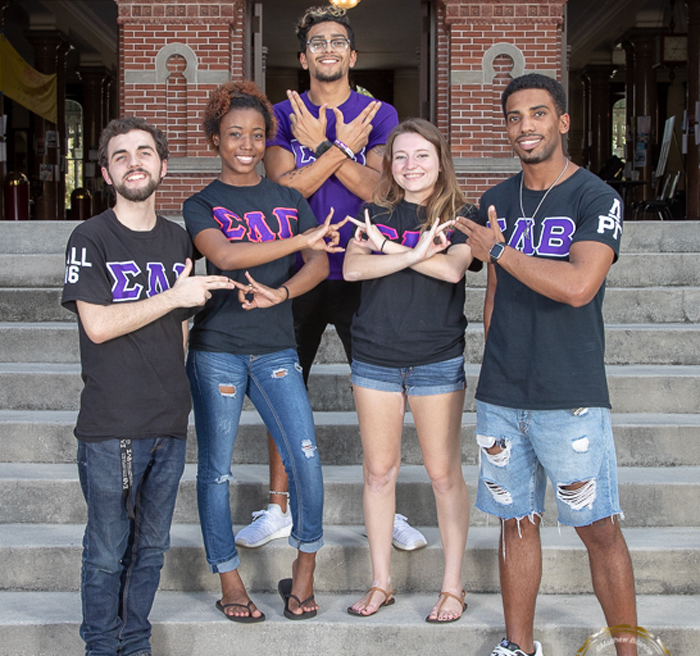- How much does it cost to be a member of a chapter in Fraternity and Sorority Life (FSL)?
- What is the time commitment of being a chapter member?
- I’ve heard that fraternities and sororities haze their members. Is that true and what is The University of Tampa’s stance on hazing?
- What are the advantages and benefits of joining Fraternity and Sorority Life?
- What are some questions I should think about before joining a fraternity/sorority?
- My student wants to join a fraternity/sorority. What is my role as a family member?
- What are the housing options once I join a fraternity/sorority?
- How many students on campus are in a fraternity or sorority?
How much does it cost to be a member of a chapter in Fraternity and Sorority Life (FSL)? | Back to top.
There are costs or dues associated with being a member in a fraternity or sorority. These expenses are used to fund social events, chapter operations and programming. Some chapter dues are all inclusive while others are not and that is up to the discretion of each chapter. This money also allows (inter)national headquarters to provide resources and other support to the chapter. Please contact individual chapters here at UT to learn more about their dues.
What is the time commitment of being a chapter member? | Back to top.
Time management plays a crucial role for all students enrolled in college, and everyone manages their time differently. Many students in fraternity and sorority life are able to balance their academics, jobs, internships and other involvement on campus while being actively involved with their chapter. The time commitment involved being an active member in a chapter varies, but most chapters have weekly meetings and other mandatory events throughout the course of the academic year that are planned in advance.
I’ve heard that fraternities and sororities haze their members. Is that true, and what is The University of Tampa’s stance on hazing? | Back to top.
The University of Tampa does not tolerate any acts of hazing by any student, organization or team or any other member of the University community. Hazing is related specifically to pledging, being initiated into, developing an affiliation with, holding office in, or maintaining membership in any organization. Hazing is defined as any activity that humiliates, degrades, abuses or endangers a person, regardless of a person's willingness to participate, or is otherwise prohibited by Florida Statutes 1006.63. Students are prohibited from the following:
- Actively participating in any activity related to hazing.
- Passively participating in or having knowledge of any activity related to hazing.
The following is information regarding Andrew's Law as well as the Florida Statute covering hazing:
Andrew's Law
Andrew’s Law is a bill that passed in the state of Florida after the death of a Florida State University fraternity student in 2017. This law states that a person may not be prosecuted if he or she establishes all of the following:
- That he or she was present at an event where, as a result of hazing, a person appeared to be in need of immediate medical assistance.
- That he or she provided his or her own name, the address where immediate medical assistance was needed and a description of the medical issue to the 911 operator or campus security at the time of the call.
- That he or she remained at the scene with the person in need of immediate medical assistance until such medical assistance, law enforcement or campus security arrived and that he or she cooperated with such personnel on the scene.
A person is immune from prosecution under this section if the person establishes that, before medical assistance, law enforcement or campus security arrived on the scene of a hazing event, the person rendered aid to the hazing victim. For purposes of this subsection, “aid” includes, but is not be limited to, rendering cardiopulmonary resuscitation to the victim, clearing an airway for the victim to breathe, using a defibrillator to assist the victim, or rendering any other assistance to the victim which the person intended in good faith to stabilize or improve the victim’s condition while waiting for medical assistance, law enforcement or campus security to arrive.
Visit the complete language on Andrew’s Law.
Florida Statute on Hazing
In accordance with Section 1006.63 (1)*, Fla. Stat., the term includes, but is not limited to, pressuring or coercing the student into violating state or federal law; any brutality of a physical nature, such as whipping, beating, branding, exposure to the elements, forced consumption of any food, liquor, drug, or other substance, or other forced physical activity that could adversely affect the physical health or safety of the student; or any activity that would subject the student to extreme mental stress, such as sleep deprivation, forced exclusion from social contact, forced conduct that could result in extreme embarrassment, or other forced activity that could adversely affect the mental health or dignity of the student. Hazing does not include customary athletic events or other similar contests or competitions or any activity or conduct that furthers a legal and legitimate objective.
The Florida Statute has expanded and updated redefining the term “hazing;” expanding the crime of hazing, a third-degree felony, to include when a person solicits others to commit or is actively involved in the planning of hazing; expanding the crime of hazing, a first-degree misdemeanor, to include when a person solicits others to commit or is actively involved in the planning of hazing; providing a short title; providing that a person may not be prosecuted if certain conditions are met; providing immunity from prosecution to persons who meet specified requirements; defining the term “aid.”
Visit the complete statute.
What are the advantages and benefits of joining Fraternity and Sorority Life? | Back to top.
FSL at The University of Tampa has many benefits that you may not find in other organizations on campus. We take pride in what our community has to offer once a student accepts membership into a fraternity or sorority. Joining a fraternity or sorority allows students to develop leadership skills, promotes academic excellence and achievement, and provides students with many hands-on philanthropic opportunities. Fraternities and sororities are also values-based organizations, and there is an expectation that members are to uphold these values established by their founders. Membership in FSL offers a sense of belonging and provides students with a home away from home where they will create life-long friendships.
What are some questions I should think about before joining a fraternity/sorority? | Back to top.
- What values does this organization promote?
- How will membership affect your student's academics?
- What is expected of fraternity/sorority members?
- What type of member is the chapter looking for?
- What leadership opportunities are available to students as both new members and active members?
- Does the chapter perform hands-on community service? If so, how often?
- What are the expenses associated with membership? How does this vary as a new member?
- What is the time commitment?
My student wants to join a fraternity/sorority. What is my role as a family member? | Back to top.
Joining a fraternity or sorority at UT is a memorable experience for all students. During the recruitment or intake process, many students need support from their family members, because there are many factors to consider when joining. As a family member, you can support your student by encouraging them to do their research on the fraternities and sororities on campus. It is important for your student to ask questions before they make a decision to join, as every organization on campus is different. It is also important to talk about the financial obligations and time commitment before joining. You can also support your student by being an active listener. Many times your student needs an outlet to discuss the pros and cons about joining. If you as a family member have any more questions or would like to learn more about supporting your student through this journey, please reach out to the coordinator of Fraternity and Sorority Life!
What are the housing options once I join a fraternity/sorority? | Back to top.
Currently, the fraternities and sororities do not have any recognized housing options on or off campus. Many students live on campus with members in their chapter or other chapters. The University of Tampa does not recognize any houses off-campus that members of fraternities and sororities live in nor should chapters be promoting these establishments as owned by their organizations and the University.
How many students on campus are in a fraternity or sorority? | Back to top.
The University of Tampa has a thriving fraternity and sorority life community. FSL encompasses 25 (inter)national fraternities and sororities, four governing councils and nearly 1,600 students! We are proud that 21 percent of the undergraduate student population has membership and are actively involved with the fraternity and sorority community at UT.
401 W. Kennedy Blvd
Box 20F
Tampa, FL 33606
(813) 253-6233
utampafsl@ut.edu
Kyle Shatto
Director of Fraternity and Sorority Life
Madi Bridges
Coordinator of Fraternity and Sorority Life





